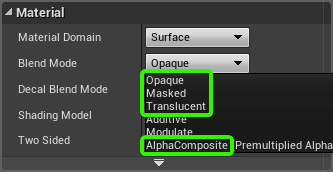This page provides information on the native Unreal Materials and Material Instances.
Overview
V-Ray for Unreal support the rendering of native Unreal Materials and Material Instances. Materials are used to calculate how light interacts with surfaces. These calculations are done using incoming data that is input to the Material from a variety of images (textures) and math expressions, as well as from various property settings inherent to the Material itself. Each time a change is made in the material it has to recompile which can be very time consuming depending on the complexity of the shading graph. Material instancing is used to change the appearance of a Material without incurring an expensive recompilation of the Material using predefined parameters. For more information on Unreal Materials and Material Instances check the Materials documentation.
Supported Expressions
Below are listed the expressions in the Material Editor that are supported by V-Ray for Unreal.
Native Unreal Materials are supported in Hybrid rendering. Make sure you meet the System Requirements.
| Category | Expressions |
|---|---|
| Atmosphere | |
Constants | |
| Coordinates | |
| Custom | |
| Depth | |
| Function | |
| Material Attributes | |
| Math | |
| Parameters | |
| Particles | |
| Terrain | |
| Texture | |
| Utility | |
| VectorOps |
Supported Material Inputs, Blend Modes and Shading Models
Below are listed all inputs, Blend modes and Shading models in the Material Editor that are supported by V-Ray for Unreal.
| Inputs | |
|---|---|
| Base Color | ✓ |
| Metallic | ✓ |
| Specular | ✓ |
| Roughness | ✓ |
| Emissive Color | ✓ |
| Opacity | ✓ |
| Opacity Mask | ✓ |
| Normal | ✓ |
| World Position Offset | - |
| World Displacement | - |
| Tessellation Multiplier | - |
| Subsurface Color | - |
| Clear Coat | ✓ |
| Clear Coat Roughness | ✓ |
| Ambient Occlusion | - |
| Refraction | - |
| Pixel Depth Offset | - |
| ClearCoatBottomNormal | ✓ |
| Blend Modes | |
|---|---|
| Opaque | ✓ |
| Masked | ✓ |
| Translucent | ✓ |
| Additive | - |
| Modulate | - |
| Alpha Composite | ✓ |
| Shading Modes | |
|---|---|
| Unlit | ✓ |
| Default Lit | ✓ |
| Subsurface | - |
| Preintegrated Skin | - |
| Clear Coat | ✓ |
| Subsurface Profile | - |
| Two Sided Foliage | - |
| Hair | - |
| Cloth | - |
| Eye | - |
Footnotes
1 – Only Camera Position (Absolute World Space) and Viewport Offset are supported.
2 – Time input is supported with only static value.
3 – Pixel Position output not supported.
4 – Coordinate index 0 is only supported. Tiling and mirror options are not supported.
5 – Will be skipped in the shader graph.
6 – Normal input is not supported.




